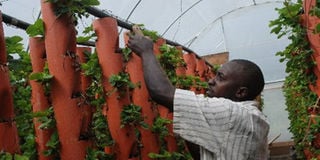Online hub lures ‘digital’ youth back to farms

What you need to know:
- A moment at the site is eye opening on just the kind of information the young farmers seek from fellow members.
Forget the search for the elusive jobs. Youths who graduated from school recently are going back to farms and making good returns.
And the problem is no longer marketing their produce; they have set up a digital marketing platform where buyers meet sellers — online.
In the last six months alone, the digital farmers hub has risen to over 13,900 members, creating a seller-buyer pool that is now drawing graduates and school leavers into agribusiness.
Dubbed Mkulima Young, youths in rural areas are earning thousands of shillings every month.
Take Daniel Kimani, one of the champions of Mkulima Young, for example. A mechanical engineering diploma holder, he has mounted an aquaponic project that is earning him about Sh300,000 a month. He runs a fish rearing and strawberry farming project.
He taps ammonia produced by the fish in form of waste to organically grow the strawberries. The berries do not require soil or manure and are mounted on 2-metre plastic towers which carry at least 20 plants.
“The fish waste-filled pond water is taken through the stone-filled tower to filter it, its oxygenated and returned to the pond. It leaves the ammonia on the tower which strawberry uses to grow,” says Mr Kimani, who is also trained in Aquatic Science at Moi University.
The project in Gitiri, Kinangop, has 5,000 fingerlings and 5,000 fish and soon, he will have about 2.5 tonnes of fish. “The mathematics is simple. One kilo of fish goes for Sh400. 2,500 kilos will bring Sh1 million,” he says.
The towers on which he grows the berries are on wooden blocks of 3-by-2 feet which carry 400 plants. “My 300 blocks have 12,000 plants which produce at least 1,000 kilos of strawberry per month. I sell a kilo at Sh500,” he explains. All this came from a Sh200,000 seed capital.
Another Mkulima Young member Money team visited is Maryann Wairimu, 22. At her Gad Eden greenhouse and nursery in Kiserian, Kajiado County, she plants seedlings for traditional vegetables and horticultural crops.
The Applied Science graduate is contracted by farmers who want to plant crops and she grows the seedlings in her nursery.
She needed Sh100,000 to put up the mini greenhouse and buy trays. Today, through postings at Mkulima Young website, she sells the seedlings to as far as Uganda. She joined the hub when it had 83 members in February. Each month, the least I get is a profit of Sh70,000,” she reveals.
At her nurseries, there are seedlings of capsicum, tomatoes, strawberry, and more than 20 types of vegetables. When the seedlings are mature, I post on the site that I have them and the orders come,” she says.
In Mweiga, Nyeri County, Regina Muthoni, 21, runs Mwema Innovations, a fodder hydroponics farm. Here, she grows and trains farmers to plant barley grass in water without using soil. She sells barley seeds for Sh100 a kilo.
“A kilo of seeds produces 8-10 kilos of fodder. An area measuring 5-by-2.5 metres will grow fodder that can feed 37 pigs, 54 chicken and three dairy cows as a supplement to raise production,” notes Regina, an alumnus of Othaya Girls.
A perusal into her income data indicates she sells about 100 bags of the fodder, earning her not less than Sh60,000 per month.
“To start a small set up, you require about Sh20,000,” she says
Each of these farmers has benefited from Mkulima Young membership. “When I have a question, produce to sell or something I need to buy, I post it there. Calls start to come in immediately,” says Ms Wairimu.
A moment at the site is eye opening on just the kind of information the young farmers seek from fellow members.
Mkulima Young founder Joseph Macharia says over half of the members are farmers. Others are traders in agricultural produce and several of them are experts in various fields,” says Mr Macharia, an agriculture extension expert.
Earn decent incomes
He says 95 per cent of the members are aged 32 years and below.
“Most times, we host agriculture programmes in local radio stations. Nine out of 10 listeners who contact us are aged 25-30 years,” he says.
The ultimate goal, he notes, is to attract youths back to farms where they can earn decent incomes.
“The digital platform helps get the market and information from either the experts or those experienced in farming of certain crops or livestock,” he says.
Social media is where the youths are.
According to the director of Extension Services at the Ministry of Agriculture, Ms Mary Kamau, there are only 5,600 extension officers in the country.
“1,600 are in management level while only 4,000 are in active practice,” said Ms Kamau. She notes that Kenya needs 8,000 more technical and field officers to serve a growing number of farmers.




